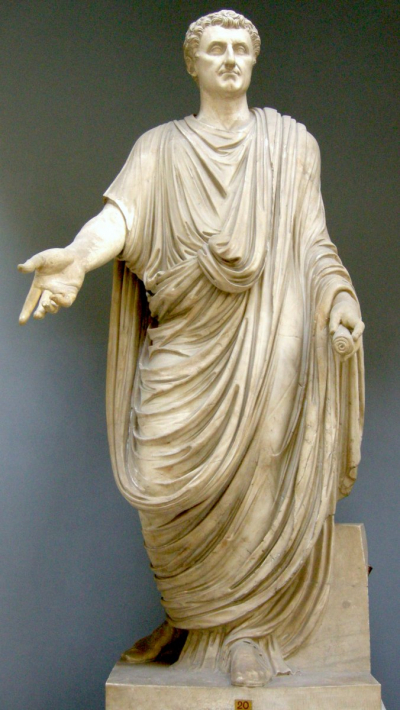Adoption in ancient Rome was practiced and performed by the upper classes; a large number of adoptions were performed by the Senatorial class. Succession and family legacy were very important; therefore, Romans needed ways of passing down their fortune and name when unable to produce a male heir. Adoption was one of the few ways to guarantee succession, so it became a norm to adopt young males into the homes of high ranking families. Due to the Roman inheritance laws (Lex Falcidia), women had very little rights or the ability to inherit fortunes. This made them less valuable for adoption. However, women were still adopted and it was more common for them to be wed to an influential family.
Nerva (; originally Marcus Cocceius Nerva; 8 November 30 – 27 January 98) was Roman emperor from 96 to 98. Nerva became emperor when aged almost 66, after a lifetime of imperial service under Nero and the rulers of the Flavian dynasty. Under Nero, he was a member of the imperial entourage and played a vital part in exposing the Pisonian conspiracy of 65. Later, as a loyalist to the Flavians, he attained consulships in 71 and 90 during the reigns of Vespasian and Domitian, respectively.
On 18 September 96, Domitian was assassinated in a palace conspiracy involving members of the Praetorian Guard and several of his freedmen. On the same day, Nerva was declared emperor by the Roman Senate. As the new ruler of the Roman Empire, he vowed to restore liberties which had been curtailed during the autocratic government of Domitian.
Nerva's brief reign was marred by financial difficulties and his inability to assert his authority over the Roman army. A revolt by the Praetorian Guard in October 97 essentially forced him to adopt an heir. After some deliberation Nerva adopted Trajan, a young and popular general, as his successor. After barely fifteen months in office, Nerva died of natural causes on 27 January 98. Upon his death he was succeeded and deified by Trajan.
Although much of his life remains obscure, Nerva was considered a wise and moderate emperor by ancient historians. Nerva's greatest success was his ability to ensure a peaceful transition of power after his death by selecting Trajan as his heir, thus founding the Nerva–Antonine dynasty.

 English
English  español
español  français
français  português
português  русский
русский  العربية
العربية  简体中文
简体中文 
